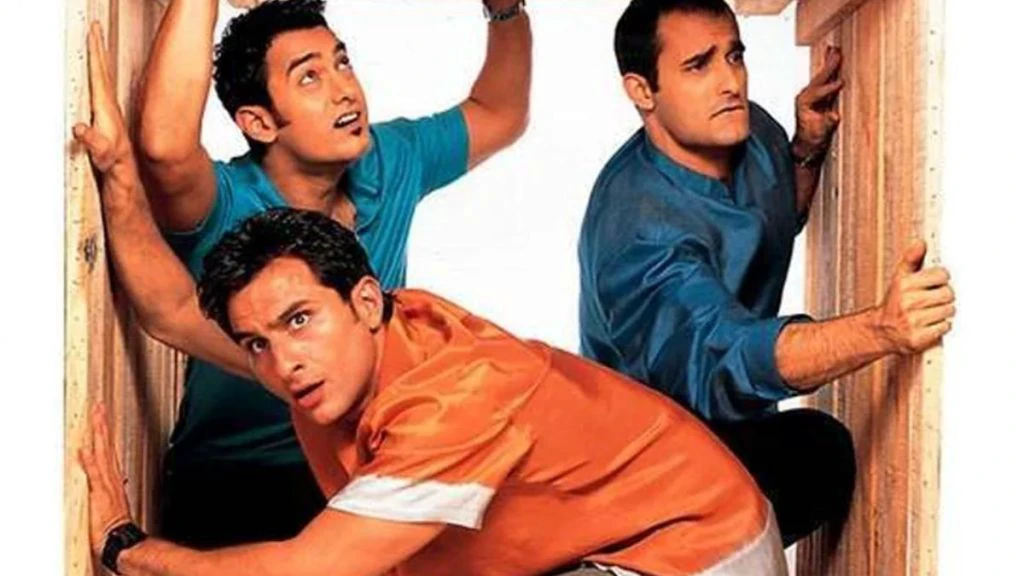At the end of this intriguingly endearing film about youthful synergy, Aamir Khan, playing the arrogant, sometimes insufferably cocky Akash, drawls, “You can’t improve on perfection anyway.”
Apparently, you can. Barely two months after Lagaan, Mumbai’s most adventurous actor Aamir Khan got together with an outstanding debutant director named Farhan Akhtar to put together a film that’s flawless in almost every detail.
Dil Chahta Hai is the kind of film that makes us sing hosannas for that much-maligned genre of popular entertainment known as mainstream Hindi cinema. It’s a brilliantly written story of three friends who grow into maturity together, losing some intrinsic values and extrinsic vanity on the way to maturation. If Dil Chahta Hai can be enjoyed on one level as a perfect soufflé entertainment with outstanding performances, brilliant choreography (Farah Khan), and perky, pert and pertinent songs (by Shankar-Ehsaan-Loy), on another level, the film’s sublinear contexts regarding the choices one makes in life are so weightlessly profound, we get blown away with debutant Farhan Akhtar’s narration.
The editing (A. Sreekar Prasad) is austere but never over-tight. The characters, each memorable, real, vivid, and obtainable, get enough breathing space to grow along with the story. Cinematographer Ravi K. Chandran’s visual poetry adds an extra dimension to the restlessly articulate narration.
Farhan Akhtar’s insightfully young screenplay details the pangs and bangs in the lives of three college friends. There’s Siddharth (Akshaye Khanna), a painter and an artiste, whose sensitivities seek an anchor in the company of a middle-aged alcoholic divorcee, Tara Jaiswal (Dimple Kapadia). The relationship with the older woman is handled with subtle delicacy. We never feel we are being persuaded to believe in the characters’ motivations. They are who they are. And we love them for it.
Sameer (Saif Ali Khan) is the dreamer. His romantic escapades in Goa and Mumbai make his two buddies, as well as us, smile and smirk. There’s an amazing flow of empathy not only among the three male protagonists but also between the protagonists and the audience. Egged on by sparklingly witty dialogues and insightful details into the working of the young urban psyche, Dil Chahta Hai proves itself a winner from the word go.
Of course, the film belongs to Aamir Khan. Moving away with startling celerity from the rural 19th-century role in Lagaan to the role of the urban with-it dude with an attitude of today, Aamir once again proves himself ‘thirst’ among equals. His quenchless quest for adventurous histrionics has taken him to a role that’s a perfect showcase for his talents. Going from a boorish disbeliever in Mumbai, Aamir’s character moves to Sydney to discover, to his (and our) amazement and amusement, that he actually believes in True Love!
What never ceases to fascinate us is the extreme and unflinching control that Farhan Akhtar exercises over his narration. It’s hard to find a single superfluous moment in the 3 hours of the film’s playing time. Some sequences, such as the one at the Sydney Opera where Akash ‘transforms’ from a swaggering cynic to a weeping romanticist, are so tricky, you fear the film may falter on its virgin road at any time.
Miraculously, every component in Farhan’s first film holds together with gravity-defying force. Nothing in Dil Chahta Hai works by mainstream cinema’s age-old rules. On occasions, such as the song-and-dance inside a cinema theatre with Saif Ali Khan and his co-star Sonali Kulkarni (who incidentally is the only performer in the film who doesn’t fit in), where the director spoofs mainstream cinema’s song-and-dance conventions, we feel the young director is taking potshots at the audience for bearing with unintelligent and trite cinematic entertainment for too long. Bear no more! Farhan Akhtar’s film redefines, realigns, and reinvents several rules of popular entertainment. That brings us to the film’s only flaw vis-à-vis the average non-urban viewer: the characters think, speak, and behave in a cosmopolitan manner. But that doesn’t make them any less credible.
If most of the characters appear utterly natural on screen, then the credit must go to the actors who fit into Farhan’s film as though born for their parts. Besides Aamir, who delivers a devilishly over-the-top performance, Dil Chahta Hai rediscovers two precious performers who have been lying low recently. In each other’s company, Akshaye Khanna and Dimple Kapadia seem to find themselves as actors and stars.
